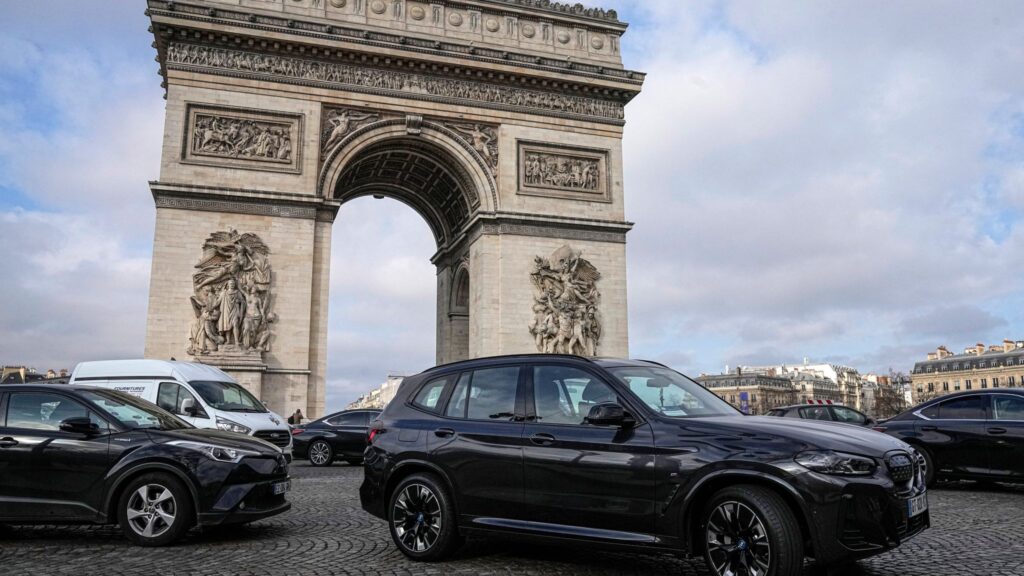Bike-friendly Paris Votes to Triple Parking Charges for SUVs

|
Listen to this story:
|
Paris, the host city for the upcoming Olympic Games, has taken a significant step towards a greener future by voting to triple parking charges for some SUVs in its central districts. This move, championed by Socialist Mayor Anne Hidalgo, aims to enhance the city’s environmental profile and create a more pedestrian and cyclist-friendly urban space.
In the recent referendum, held with a turnout of only 5.7%, more than 54% of Parisians voted in favor of increasing parking fees for SUVs weighing over 1.6 tonnes, driven by non-residents. The new pricing structure will see the hourly cost for parking these vehicles surge to €18 (£15) for the first two hours, compared to €6 (£5) for smaller cars. For a six-hour stay, the fee for an SUV would reach €225 (£192), three times the amount for smaller vehicles.
The initiative is part of Mayor Hidalgo’s broader plan to make Paris a more bikeable city, following a ban on e-scooters in the previous year. Under her leadership, 84 kilometers of cycle lanes have been added since 2020, resulting in a remarkable 71% increase in bike usage between the end of COVID lockdowns and 2023.
Hidalgo, in her campaign for the SUV parking charges increase, argued that larger vehicles occupy excessive space on narrow Parisian streets, contribute to pollution, pose threats to health and the environment, and are involved in more traffic accidents than smaller cars. She urged Parisians to “break with this tendency for cars that are always bigger, taller, wider” and take back ownership of the streets.
“We’re proud of having posed an eminently environmental question at a time the environment is presented as the source of all evil. It’s a form of resistance here in Paris to this very concerning movement,” said Hidalgo after the results were announced.
The proposed parking charges hike also drew criticism, particularly from the motorists’ lobby group “40 millions d’automobilistes,” which launched a petition advocating for drivers’ freedom to choose their vehicles. The group denounced the measure as an attack on freedom under the guise of environmental concerns.
RELATED ARTICLE: Paris To Ban Single-use Plastic at 2024 Olympic Games
“We must firmly oppose these attacks on freedom pursued under false green pretexts. If we don’t stop it now, this unjustified rebellion led by an ultra-urban and anti-car minority will spread like gangrene to other cities,” warned the motorists’ lobby group.
The mini-referendum presented Parisians with the question, “For or against the creation of a specific rate for the parking of heavy, bulky, polluting individual cars?” Responses highlighted a divided public opinion, with some emphasizing ecological considerations and parking issues, while others stressed individual freedom.
“I must consider the ecology, the parking issues. Heavier cars make congestion even more complicated. It’s about freedom,” said Cyreane Demur, a 20-year-old student who voted in favor of the SUV parking fee increase.
However, 75-year-old voter Jadine L’Orlendu expressed a different perspective, stating, “SUVs do not disturb me, they do not take more space than other cars, the parking places are marked, and people should drive what they want to drive. It’s about freedom.”
City Hall’s efforts to reduce the environmental impact of vehicles align with Hidalgo’s long-standing goal to make Paris less car-friendly. The city has already banned motor vehicles from certain roads, transforming them into pedestrian and cyclist havens. As the city prepares for the upcoming Olympics and Paralympic Games, additional bike lanes are being added to further discourage car usage.
City Hall contends that, despite a steady decrease in overall car traffic, SUVs are hindering progress and contributing to air pollution due to their larger dimensions. The new parking prices will apply not only to conventional or hybrid-engined SUVs but also to electric SUVs weighing 2 tonnes or more.
The outcome of this vote reflects a broader trend in cities worldwide, as urban areas increasingly prioritize sustainability and seek innovative solutions to reduce the environmental footprint of transportation.






